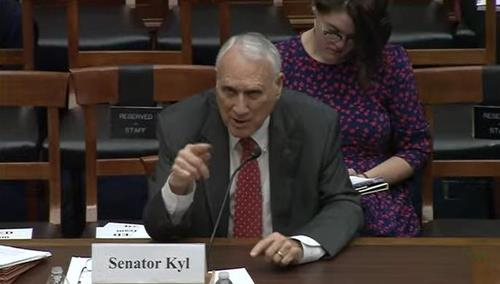Congressional panel official stresses space-based capability to counter threats from N. Korea, China, Russia
By YonhapPublished : Nov. 16, 2023 - 09:43

A US congressional commission official raised the need Wednesday to leverage more space-based defense capabilities, noting a ground-based interceptor system may have limits in dealing with the growing missile threats from North Korea, China and Russia cost-effectively.
During a House Armed Services Committee session, John Kyl, the vice chair of the Congressional Commission on the Strategic Posture of the United States, made the remarks, saying the US' GBI program is "adequate today" to deter North Korea's threats, but such threats do not remain stagnant.
The GBI is a component of the US' missile defense program, which is designed to shoot down hostile missiles during flight in the mid-course phase.
"This (GBI) is primarily to deter North Korea today," Kyl said. "The kind of system that we have is adequate today to deter North Korea. North Korea is not standing still, however."
Kyl underscored his commission's recognition that the US will have to have "better and more capable" GBI systems to deal with North Korean threats.
To deal with a "coercive" threat from China or Russia, Kyl raised the need to find a "more cost-effective" way to address it.
"That's why we say with regard to the GBI kind of program, it may have a limit and we may need to turn to more of a space-based component."
He cast a space platform as having a "much greater" potential capability against a larger threat, especially from China and Russia
"With the technological developments today in reducing launch costs and other expenses ... I think the time might well have come that this is the place where we can invest more money economically to deal with the problem rather than just continuing to build our GBI system up," he said.
His remarks came amid growing concerns about Pyongyang's push to deploy advanced solid-fuel intercontinental ballistic missiles, which experts said would make the recalcitrant regime capable of conducting a surprise launch.
This week, the regime's Korean Central News Agency reported that the North successfully conducted ground tests of new high-thrust solid-fuel engines for intermediate-range ballistic missiles -- an indication that it is doubling down on its project to refine missile capabilities.
The commission's recent report on US strategic posture said that North Korea is "on pace" to deploy nuclear-tipped ICBMs in sufficient numbers that could potentially challenge continental US ground-based ballistic missile defenses. (Yonhap)



















